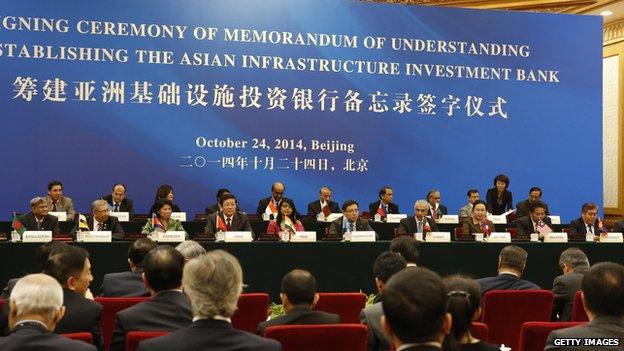Why does the UK want to join the China-led development bank?
- Published

The AIIB already has 27 member countries and is expected to be launched at the end of 2015
The UK is the first Western country to seek to become a founding member of the Asian Infrastructure Investment Bank (AIIB). It's a new international financial institution (IFI) essentially led by China and viewed as a rival to the World Bank.
There are 21 Asian countries that signed up last October to set up the AIIB. That has risen to 27, with the launch expected at the end of the year. It has about $50bn in capital, which is only a fifth of what the World Bank holds and also less than the Asian Development Bank.
But, it's solely focused on the huge gap in infrastructure funding unlike the other IFIs which fund everything related to development.
So, why does the UK want to join?
Well, it's not unusual for major economies to become a part of regional development banks. The UK is a member of the Caribbean Development Bank, for instance.
But, the China-US tensions behind the AIIB make this one more of a geo-political headache that's now playing out in headlines.
America has reportedly urged other nations to step back from the AIIB. Officially at least, the US says that it's a sovereign matter for the UK but has repeatedly called for higher governance standards in the AIIB as befits a multilateral institution.
When I asked the President of the World Bank, Jim Yong Kim, about the AIIB last year, he said that more money for infrastructure would be welcome and that they were working closely with the Chinese on the governance of the AIIB.
Rise of AIIB
The rise of a development bank led by China can also be viewed as a reaction to the slow reforms of the existing Western-dominated IFIs.
The US has an effective veto in the IMF and the head of the World Bank is typically American, while the head of the IMF is European.
After years of negotiation, which sped up when emerging economies were asked to supply funds during the 2008 global financial crisis, the stake-holdings have shifted more toward China and other developing countries but the IMF and World Bank are still largely Western-led.
There was a push to create an Asian IMF after the 1998 Asian financial crisis which was defeated at the time. But now, China is a much more powerful nation and the world's second largest economy wants to lead its own IFI.
It's a tricky task to align oneself with both China and the US. The Americans are apparently unhappy with the UK, while the British application.
It may be a pragmatic move, but it's hard not to offend one side or another.
I suspect this will be the first of many decisions to be taken by countries such as the UK to position themselves between the new economic superpower and the existing one.
The trick will be to come away with economic advantage at minimal political cost. We'll find out if this one will pay off for the UK.